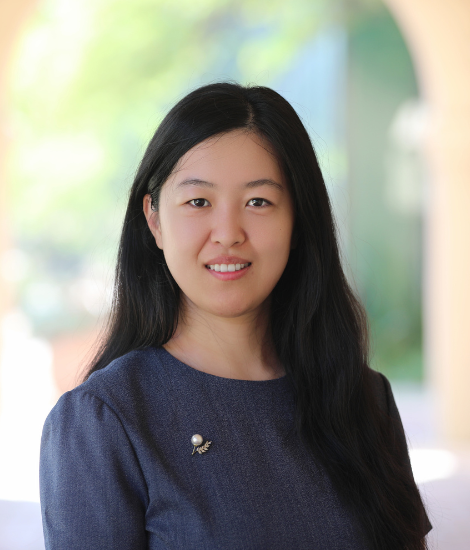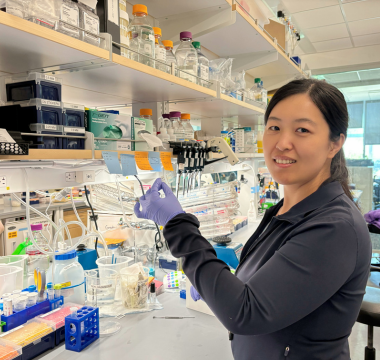My PD Story

Yujie Fan, PhD
2025 Postdoctoral Fellowship
Creating Self-Folding Alpha-synuclein to Better Understand Parkinson’s
A primary driver of Parkinson’s disease (PD) is the accumulation and spread in the brain of a misfolded form of a protein called alpha-synuclein. When misfolded, alpha-synuclein forms clumps called Lewy bodies that clog up brain cells called neurons. These clumps can cause other alpha-synuclein proteins to misfold as well, cascading the disruption as the disease progresses.
Despite decades of innovation, conducting in vivo research (animal experiments, as opposed to cells in petri dishes) of alpha-synuclein in PD has been challenging. Getting alpha-synuclein to misfold in a way that mimics human PD in specific neurons on-demand is difficult, but Yujie Fan, PhD, recipient of a Parkinson’s Foundation Postdoctoral Fellowship, believes she has developed a new tool to accomplish this task.
Under the mentorship of Viviana Gradinaru, PhD, at the California Institute of Technology in Pasadena, Dr. Fan designed a new technology for creating what she calls “self-assembling alpha-synuclein" (SAS) molecules. These SAS constructs are made of normal alpha-synuclein with attachments that allow researchers to trigger misfolding in cells on-demand. The SAS technology also allows Dr. Fan to pick specific cells in which the misfolding occurs, such as the dopamine neurons in the brain most affected by PD. Importantly, this tool overcomes many of the limitations that have hindered other research models of alpha-synuclein in PD.

“This award supports the development of an innovative tool named self-assembling synuclein (SAS) to model Parkinson's disease in a quantitative, inducible, tunable and cell-type-specific manner.”
- Dr. Fan
Once the SAS tools have been fine-tuned and tested, Dr. Fan will implement them in mice to see if they can recreate alpha-synuclein misfolding and clumping like is seen in human PD. Her early results in mice show that the SAS model faithfully mimics many of the movement impairments commonly seen in people with PD, suggesting that her tools are working as expected. She will then test how alpha-synuclein misfolding in the gut might initiate PD-like symptoms, following recent research suggesting that PD could start in the gut.
Refining and building upon this SAS technology will grant Dr. Fan and other PD researchers the ability to study the disease in new, more precise ways. The groundbreaking data and insights generated from these SAS experiments can lead to improved treatments and advance the field toward a cure for PD.
Speaking on what this fellowship means to her and PD research broadly, Dr. Fan said “This award gives me the freedom and confidence to pursue bold, yet high-rewarding ideas. The insights gained from this work could help identify new treatment targets and improve how we test potential therapies. Ultimately, this research aims to bring us closer to stopping disease progression in PD.”
Meet more Parkinson’s researchers! Explore our My PD Stories featuring PD researchers.
Related Materials
More Stories
from the Parkinson's community


